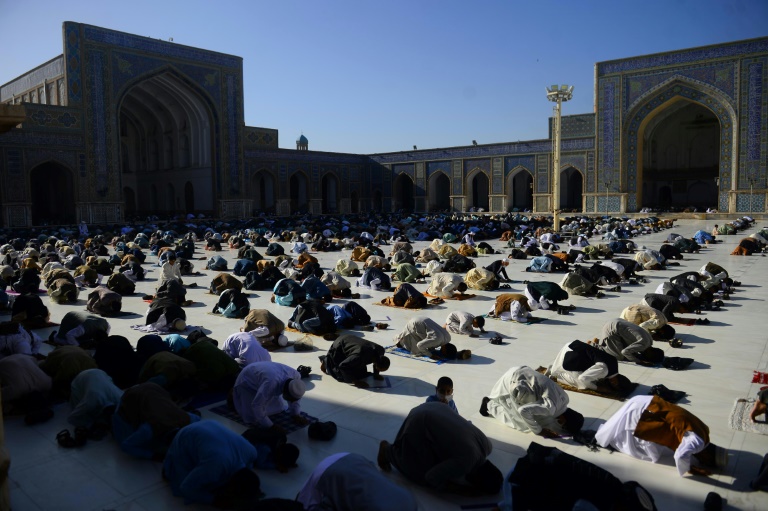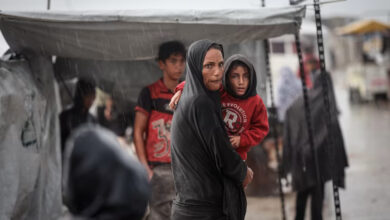
Afghan President Ashraf Ghani began a process Sunday to release up to 2,000 Taliban prisoners as a goodwill gesture after the insurgents proposed a surprise ceasefire during the Eid holiday.
The ceasefire appeared to hold as there were no reports of fighting between the insurgents and Afghan forces by the end of the first day on Sunday.
Ghani also said the government was ready to hold peace talks with the Taliban after accepting their offer of a three-day truce over the Eid al-Fitr holiday that marks the end of the Muslim holy fasting month of Ramadan.
The decision to release the prisoners was a “goodwill gesture” and was taken “to ensure success of the peace process”, Ghani’s spokesman Sediq Sediqqi said on Twitter.
A US-Taliban deal signed in February stipulated that the Afghan government would release up to 5,000 Taliban prisoners while the insurgents would free about 1,000 Afghan security force personnel.
The prisoner swap is seen as a confidence-building move ahead of long-awaited peace talks between the government and Taliban.
Before Sunday’s announcement, Kabul had already released about 1,000 Taliban inmates while the insurgents had freed roughly 300 members of the Afghan security forces.
The insurgents said they were committed to free prisoners, but reminded Kabul that the deal was to “release 5,000” of their members as agreed with the US in Doha.
“This process should be completed in order to remove hurdles in the way of commencement of intra-Afghan negotiations,” a Taliban spokesman, Suhail Shaheen, said on Twitter.
Ghani said a government delegation was “ready to immediately start the peace talks” with the insurgents.
Government negotiators would be headed by Ghani’s former bitter rival Abdullah Abdullah after the two signed a power-sharing deal last week that ended a months-long political crisis.
– Freed Taliban must not fight –
“We have not received a single report of clash or fighting among our Mujahideen and the enemy forces,” Taliban spokesman Zabihullah Mujahid told AFP late Sunday.
Police spokesmen from provinces including Kunduz, Baghlan and Takhar where regular clashes have occurred also told AFP that they had received no reports of fighting during the day.
The militants’ offer of a truce came just days after leader Haibatullah Akhundzada urged Washington “not to waste” the opportunity offered by the deal with the US that set the stage for the withdrawal of foreign troops from the country after more than 18 years.
US Special Representative to Afghanistan Zalmay Khalilzad, who brokered the deal, said on Twitter Saturday that the ceasefire was “a momentous opportunity that should not be missed” while pledging that the United States would “do its part to help”.
US Secretary of State Mike Pompeo also hailed the ceasefire, but said in a statement Sunday that he expected “the Taliban to adhere to their commitment not to allow released prisoners to return to the battlefield”.
He also urged the two sides to avoid escalating violence after Eid.
US President Donald Trump’s administration has made it a priority to end America’s longest war, and in a bid to pull out foreign forces US officials have been pushing the Taliban and government leaders to hold peace talks.
Analysts, however, say the Taliban have been emboldened by the deal with the US. Afghan government officials have reported more than 3,800 attacks since it was signed, killing 420 civilians and wounding 906.
– War-weary –
Khalilzad has maintained that the insurgents have kept up their end of the bargain by not attacking the US-led coalition forces — even if recent violence violated the spirit of the accord.
His remarks came after an attack against a maternity hospital in Kabul killed dozens — including mothers and infants — and a suicide bombing at a funeral.
The Taliban denied involvement in the attacks, but Ghani blamed them and the Islamic State group for the violence.
War-weary Kabul residents expressed relief after the truce was announced.
Since the US invasion of Afghanistan in 2001 there has only been one other ceasefire — a three-day pause between the Taliban and Kabul, also marking the end of Eid, in 2018.
That ceasefire was initiated by Ghani.
Image: AFP / HOSHANG HASHIMI Muslim devotees in Afghanistan’s Herat offer prayers at the start of the Eid al-Fitr festival which marks the end of the Muslim holy month of Ramadan, and coincides with a three-day truce between the Taliban and government




